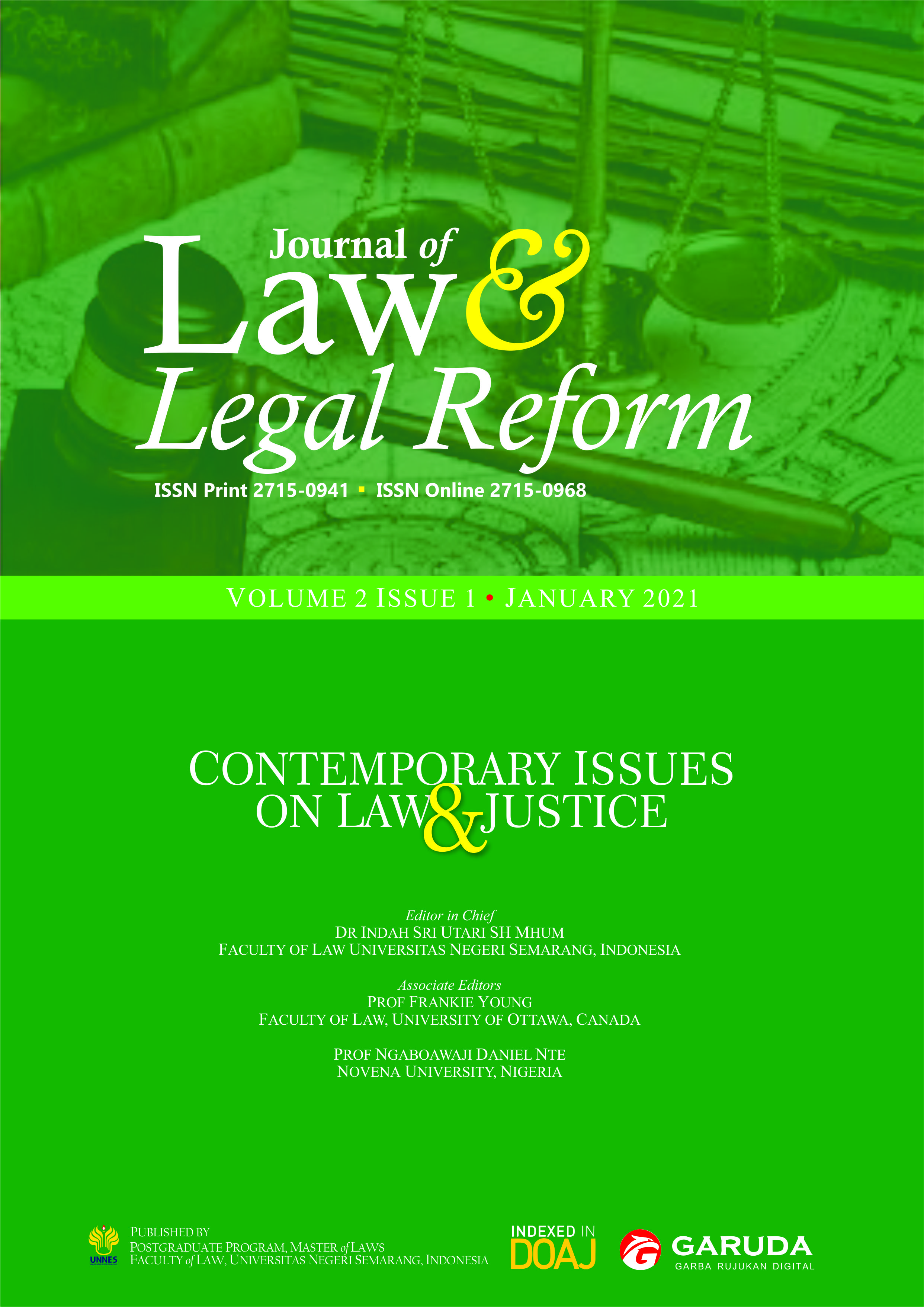Political Dynasty in Law and Political Perspective: to what extent has the Election Law been reformed?
Main Article Content
Abstract
A democratic state allows for the birth of a dynastic politics. Indonesia as a democracy must accept these consequences. As long as dynastic politics are in accordance with the constitution and do not violate democratic principles, the state accommodates the birth and development of dynastic politics. In Indonesia, since the opening of the doors of reform and regional autonomy, it has led to a democratization of political power at the center as well as in the regions. Dynastic politics also grows and develops. The growth and development of dynastic politics occurs at the level of political power in the regions. In the Tegal Raya region, dynastic politics led by the Dewi Sri clan had experienced developments and was able to place several members of the Dewi Sri clan in several political powers. But interestingly, the political development of the dynasties in the Tegal Raya region must be reduced. This article analyzes the factors that influence the development and reduction of dynastic politics in the Tegal Raya Region.
Article Details
All writings published in this journal are personal views of the authors and do not represent the views of this journal and the author's affiliated institutions. Author(s) retain copyrights under a Creative Commons Attribution-NonCommercial-ShareAlike 4.0 International (CC BY-NC-SA 4.0).
References
Agustino, L., & Yusoff, M. A. (2010). Politik Lokal di Indonesia: dari Otokratik ke Reformasi Politik. Jurnal Ilmu Politik AIPI, No.21. http://www.aipi-politik.org/attachments/article/54/3__Politik%20Lokal%20di%20Indonesia__Leo%20Agustino__Jurnal%20AIPI__No.21%20Thn%202010.pdf
Andrain, C. F. (1992). Kehidupan Politik dan Perubahan Sosial, Luqman Hakim (trans), Yogyakarta: Tiara Wacana.
Basarah, A. (20202). “Pilkada Pemalang: Agung-Mansur Naik Becak Mendaftar ke KPUâ€, Suara Merdeka, 7 September 2020, retrieved from: https://www.suaramerdeka.com/news/pilkada/239886-pilkada-pemalang-agung-mansur-naik-becak-mendaftar-ke-kpu
Budi, T. (2013). “Dinasti Politik Ratu Atut Jelek dan Merusak Demokrasiâ€, Okezone News, 15 October 2013, retrieved from: https://news.okezone.com/read/2013/10/15/339/881681/dinasti-politik-ratu-atut-jelek-dan-merusak-demokrasi.
Cillessen, A. H., & Rose, A. J. (2005). Understanding popularity in the peer system. Current Directions in Psychological Science, 14(2), 102-105.
Cottam, D. U. Mastor, & Preston, P. (2004). Introduction to Political Psychology. New Jersey: Erlbaum.
De Laet, S., Doumen, S., Vervoort, E., Colpin, H., Van Leeuwen, K., Goossens, L., & Verschueren, K. (2014). Transactional links between teacher–child relationship quality and perceived versus sociometric popularity: A threeâ€wave longitudinal study. Child development, 85(4), 1647-1662.
Detik News. (2015). “Koruptor Empat Sekawan: Akil Mochtar, Susi, Ratu Atut dan Wawanâ€, Detik News, 27 February 2015, retrieved fromhttps://news.detik.com/berita/d-2844536/koruptor-empat-sekawan-akil-mochtar-susi-ratu-atut-dan-wawan.
Fajar Eko Nugroho, 20 July 2015, “Tiga Pasang Calon Bupati dan Wakil Bupati Daftar Ke KPU Pemalangâ€, Retreived from: https://jateng.tribunnews.com/2015/07/28/tiga-pasang-calon-bupati-dan-wakil-bupati-daftar-ke-kpu-pemalang on: 13 November 2020.
Haboddin, M. (2015). Politik Primordialisme: dalam Pemilu di Indonesia. Malang: Universitas Brawijaya Press.
Hijjang, P., & Amelia, L. (2019). Assajingeng: Politik Kekerabatan di Pilkada Kabupaten Bone (Analisis Antropologi Politik). Jurnal Socius: Journal of Sociology Research and Education, 6(2), 121-134. doi:10.24036/scs. v6i2.161
Hikmawati, S., & Hariyadi, S. (2017). Kecenderungan Alienasi Politik Mahasiswa UNNES (Suatu Tinjauan Psikologi Politik). Intuisi: Jurnal Psikologi Ilmiah, 7(1), 1-5.
Johari, J., & Gaharu, S.L. (2013). “Duet Ikmal-Edy Mendapat Rekomendasi DPP PDIPâ€, Pantura News, 28 July 2013, http://www.panturanews.com/index.php/panturanews/baca/8694/28/07/2013/duet-ikmal-edy-mendapat-rekomendasi-dpp-pdip
KPU. (2015). “Hasil Hitung TPS Kecamatan Pemalangâ€, https://pilkada2015.kpu.go.id/pemalangkab/pemalang
Kristyarini, K. (2013). “Kakak dan Adik Calonkan Diri di Pilkada Tegalâ€, Kompas, 13 September 2013, https://regional.kompas.com/read/2013/09/13/1231518/Kakak.dan.Adik.Calonkan.Diri.di.Pilkada.Tegal
Luluardi, D. Y. (2013). Transformasi dan Strategi Klan Bisnis Menuju Pembentukan Klan Politik Dalam Politik Lokal (Studi Tentang Klan Bisnis Dewi Sri di Barat Pantura Jawa Tengah), Thesis, Yogyakarta Universitas Gajah Mada.
Muhtada, D., & Diyanto, A. (2018). Dasar-Dasar Ilmu Negara., Semarang: BPFH UNNES.
Nugroho, Y.S.A. (2013). “Gagal Menangi Pilkada Kota/Kabupaten Tegal, Dinasti Dewi Sri Mulai Surutâ€, Tribun Jateng, 6 November 2013, https://jateng.tribunnews.com/2013/11/06/gagal-menangi-pilkada-kotakabupaten-tegal-dinasti-dewi-sri-mulai-surut?page=2.
Parkhurst, J. T., & Hopmeyer, A. (1998). Sociometric popularity and peer-perceived popularity: Two distinct dimensions of peer status. The Journal of Early Adolescence, 18(2), 125-144.
Rizan, P. R. (2019). “Pro Kontra Politik Dinastiâ€, ANTARA News, 24 December 2019, retrieved from: https://www.antaranews.com/berita/1221951/pro-kontra-politik-dinasti.
Simarmata, S. (2017). Paralelisme Politik Media dalam Pemberitaan Pemilu 2014 di Indonesia. Jurnal Ilmu Komunikasi, 14(2), 149-168. https://ojs.uajy.ac.id/index.php/jik/article/viewFile/885/1072
Sinaga, O. (2016). “Dana Pengawasan Pilkada 2015 di 27 Daerah Masih Bermasalahâ€, Tempo, 22 August 2016, https://nasional.tempo.co/read/797776/dana-pengawasan-pilkada-2015-di-27-daerah-masih-bermasalah/full&view=ok
Sobari, W. (2013). Elektabilitas dan Mitos Pemilih Rasional: Debat Hasil-Hasil Riset Opini Menjelang Pemilu 2014. Jurnal Penelitian Politik, 10(1), 59-84. http://ejournal.politik.lipi.go.id/index.php/jpp/article/viewFile/218/94
Wahid, A. (2009). Quick Count: Hak Atas Informasi Atau Pembohongan Publik?. Jurnal Konstitusi, 6(3), 1-17.
